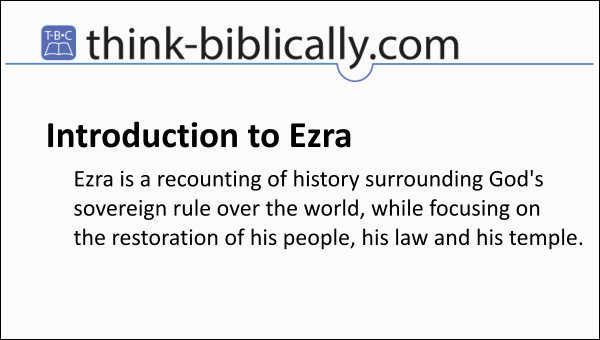By Tyson Thorne

Ezra is a recounting of history surrounding God's sovereign rule over the world, while focusing on the restoration of his people, his law and his temple. If one reads the Kings, for example, one can't help but see the differences that took place over 72 years. When Nebbuchadnezar conqured Jerusalem in 586 BC he took all the gold implements from the temple and immediately displaced the Israelites. The Jews would never have been permitted to return to Jerusalem and restore their temple under Babylonian rule. So God had the Persians conquer Babylon 45 years later.
What difference does it make who rules the Near and Middle Eastern nations? A lot, it turns out. Unlike the Babylonians, Persian kings consistently permitted the restoration of temples across the empire. Under this policy, is it any wonder that the Persian kings not only permitted the rebuilding of Solomon's temple, but went so far as to provide the returning Jewish community with silver and gold, as well as livestock necessary for temple sacrifices? King Cyrus even returned 5,400 articles of gold and silver that Nebuchadnezzar had taken as spoils of war.
Ezra took the second group of exiles back to Jerusalem. By the time he arrived the temple had been rebuilt in a basic form and offerings were already being sacrificed. Ezra helped with the rebuilding of the temple but his most prominent work was in teaching the people the Law of God and their responsibilities in the land. He established once more the Mosaic Law as the law of the land, and reached out to neighboring nations informing them that anyone who would leave their idol worship behind and embrace YHWH was welcome.
The people, as one can see from the pages of this work, were astonished when faced with the reality of their sins, and there was much conflict in mixed marriage homes. During exile many Jewish men married foreign women, and permitted the worshipof idols in their homes. Going home caused great conflict in the spiritual life of these families, and a barrier to be dismantled before Israel could become the holy people they were called to be.
Author and Date of Writing
18 years after his return to Jerusalem, Ezra, a priest, penned the volume that bears his name (circa 440 BC). Some believe he also penned Nehemiah. Unlike many Old Testament books, the oldest manuscripts kept the books of Ezra and Nehemiah separate, but later the two were combined into one book (including the Septuagint), Later still, Origen made a distinction between the two texts and separated them again, calling them First and Second Ezra. The priest penned this first work for the people of his day so they would understand God's dedication to them as a people and their need to be devoted to God and their responsibilities toward the covenant.
Big Idea
God's sovereignty is complete, not only over his people but even pagan rulers, and is often employed to restore his people to holiness when God's people renounce the world and pledge their allegiance to YHWH.
